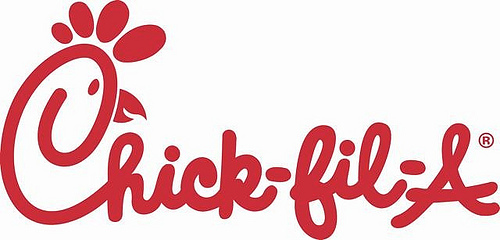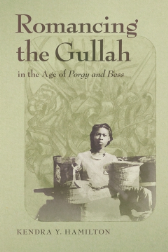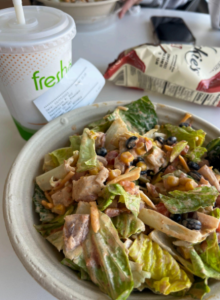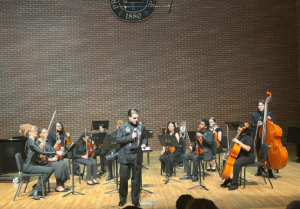Sam Series: My Pleasure

May 2, 2017
On February 20, 2017, Marshall Davis, a Chick-Fil-A owner-operator, delivered a lecture to Presbyterian College students and faculty on the significant impact putting people first can have on a business’s success. The lecture took place in Jacobs Hall at 4:30 PM, where Davis enlightened the audience on Chick-Fil-A’s unique customer service oriented culture. Room 108 was filled with students and faculty eager to learn about the hospitality that differentiates Chick-Fil-A from other quick service restaurants. Davis constantly reminded the audience the importance of character and how hospitality begins with each person’s base level of integrity. He continued to explain that creating a culture of generosity leads to comfort, establishing Chick-Fil-A as a home away from home.
Davis began the meeting by providing his background information and sharing his personal experience with the company. He explained his journey with the Cathy Foundation, a nonprofit organization created by Chick-Fil-A to train other businesses and organizations in customer service and leadership. After several years traveling and serving as a consultant for the Cathy Foundation, Davis decided to change course and become an owner-operator himself. This decision led Davis to found the Laurens Chick-Fil-A, where he now practically applies the customer service skills he taught for many years.
Davis continued by sharing the company history and S. Truett Cathy’s original vision for the restaurant. Cathy wanted to have a positive influence on anyone who came into contact with his business. This is ultimately why Chick-Fil-A to this day continues to state they are in the people business, not the chicken business. Being in the people business allows Chick-Fil-A to listen to their guests and provide them with a special service catered specifically to each individual. By subtle actions, such as employees saying “My Pleasure” after being thanked, Chick-Fil-A is able to create a welcoming and hospitable feeling within each restaurant.
Davis then explained how placing people first permeates throughout the entire corporation. It all begins with “Local Ownership of a Meaningful Brand.” By giving each operating site the autonomy to act like a local small business, it allows the restaurant to better serve its guests through local fundraisers and special events like birthday parties. This localized atmosphere further contributes to the overall welcoming community of the store. Davis also explained that Chick-Fil-A aims to be an organization “Where Good Meets Gracious.” He desires his employees to personally know customers first names and to establish genuine and authentic relationships, checking up on their major life events.
To staff these caring individuals, Davis enlightened the audience on the importance of hiring the right people. Davis personally searches for character, knowing that any employee can learn the technical skills. Davis explained that employee quality is like an iceberg: skills are the tip of the iceberg that can be seen above the water, but ultimately these skills cannot be realized if there is no solid foundation of a person’s character underneath the water. By seeking out integrity in their employees, Chick-Fil-A is able to speak the language of hospitality.
So what does this customer service centric model mean for people outside the business world? Can it even be applied to other fields?
For starters, the entire hospitality industry, comprised of resorts and hotels, has built its entire existence on customer service. When people are traveling and are away from home, they want some familiarity and hospitality; hotels are able to provide this experience through excellent customer service by prioritizing people’s needs. For example, Ritz Carlton hotels collect data and personally know the guest’s favorite drink; the refrigerator in their room is then stocked with their preferred beverage of choice. Walt Disney World Resorts similarly provides guests with an exceptional customer service experience by empowering their employees to create “magical moments” that enhance the guest’s day. An example of this would be receiving a replacement ice cream bar after accidentally dropping one on the ground.
Another area of study that utilizes hospitality is the healthcare industry. Many medical and nursing schools now require students to take classes in bedside manner. Experts are beginning to realize the importance of being compassionate to those in times of physical and mental stress; being cordial places the patient’s needs first and enriches their overall experience. If a critical care nurse offends or upsets the patient, chances are the family of the patient will not use that hospital again. By training the future leaders of healthcare in bedside manner, hospitals overall can create a more welcoming and caring community.
In conclusion, people matter. A customer is not just a transaction, but rather a special individual, and these special individuals seek out valuable relationships. No matter the industry, whether it is a community organizer or a psychiatrist, all can benefit from establishing an ongoing and genuine relationship with the clientele. Because when a person knows who they are serving, not only will they better meet the customer’s needs, but they will also joyfully serve their friend with a smile, saying “My Pleasure.”





